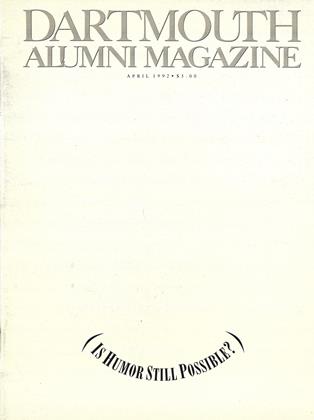1778
More than a decade after Benjamin Franklin publishes his book, Experiments and Observations on Electricity, Dartmouth Professor John Smith continues to teach that lightning is a chemical reaction.
1848
Moses Farmer, Dartmouth class of 1844, has the first home illuminated electrically. Farmer's experiments with the incandescent bulb are hampered because a reliable way of generating power does not yet exist. As Thomas Edison garners accolades, Farmer gains a brief spurt of fame for inventing the "ticker," an electric device that prints Morse code.
1872
The U.S. patent office selects Dartmouth as the repository for 700 models of unpatentable inventions.
1895
Because he was deemed a bad risk by an insurance company, an obese Horace Fletcher '70 invents one of America's first fad diets. He later dies of bronchitis.
1905
Applying the same principle that makes fingerprinting an effective means of identifying people, Huntington Smith '87 invents the "muzzle print" for dogs.
1906
Louis Bell '84, the first electric illumination consultant, debunks fears raised by ophthalmologists that artificial light is bad for the eyes.
1911
Collier's Weekly profiles Morrill Goddard '85, originator of the colored supplement to the Sunday paper.
1917
G. Norman Albree '12 designs and builds the first monoplane accepted by the United States government.
1932
Frank Austin '95, a retired professor at the Thayer School, invents a bestselling new toy: the ant house. The New York Times dubs Hanover the "center of the new ant industry" as millions of ants depart from the local Railway Express office.
1953
James Arthur Field '46 wants to keep his pants dry without looking ridiculous so he invents raincoat chaps. His motto is "Don't Get Caught with Your Pants Drowned."
1964
Dartmouth students and faculty pioneer the concept that all undergraduates, not just those in science and engineering, can program computers for educational purposes.
1977
The College adopts a policy on patents and copyrights in which it retains 75 percent of any income for an invention "developed as a result of College duty."
1987
Procedures developed by Dartmouth researchers that have potential uses in cancer and AIDS treatments are transferred to Medarex, a private biotechnology firm, in exchange for 420,000 shares of stock. When Medarex conducts clinical trials of a leukemia treatment, the value of the College's holding jumps to $4 million.
1991
Researchers at the Thayer School predict that ethanol made from cellulosic biomass can be produced on a large scale within ten years. Motorists may soon be filling their tanks with alcohol produced by grass, wood, and municipal waste.
Field's pants are wettable.
 View Full Issue
View Full Issue
More From This Issue
-
 Cover Story
Cover StoryIS HUMOR STILL POSSIBLE?
April 1992 By ROBERT SULLIVAN '75 -
 Feature
FeatureTo Dream With Open Eyes
April 1992 By flagg Miller '91 -
 Feature
FeatureThe River
April 1992 By W. D. Wetherell -
 Feature
FeatureJoy Kenseth's Wonder Room
April 1992 By Karen Endicott -
 Feature
FeatureAn Award In Honor Of The Risk Taker
April 1992 -
 Article
ArticleThe Imagination Unbound
April 1992 By Ulrike Rainer







